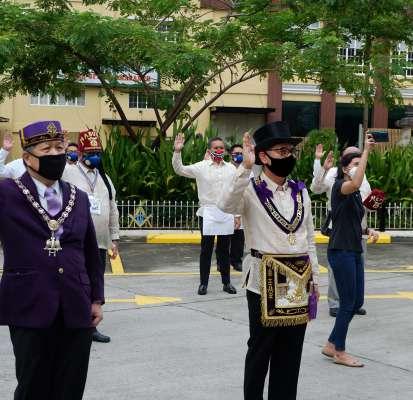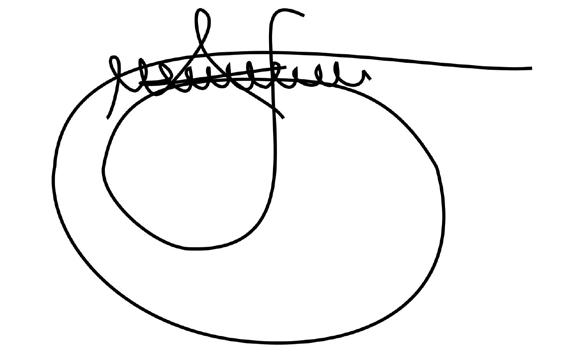
7 minute read
Message from the Grand Master on Independence Day June 12, 2020
My dear brethren:
Today we celebrate the 122nd Independence Anniversary of our beloved country. I believe that since the recognition of June 12, 1898 as our true date of independence, we masons have always been present in good numbers in various Independence Day ceremonies throughout the country, proudly clad in our masonic attire to celebrate this day. And rightfully so because aside from being a national event, we have always considered this day as a true masonic occasion in itself.
Advertisement
However, for the first time, we are unable to assemble as modern day masons and descendants of our past brethren - the heroes of our revolution –and salute their glorious accomplishment. Sadly, the impact of the Coronavirus has once again forced us to remain in the sidelines. But we cannot let this important occasion pass without any commemoration, no matter how small and humble. For truly, our brethren heroes have played vital roles in our quest for independence as a nation. They deserve our accolade and admiratio n, they deserve nothing less than the recognition of the entire nation.
Yet, for all the great influence of Freemasonry in the formation of our free nation, history books would just relegate the role of the institution as a simple footnote in our nation’s struggle for independence. We do not mind - because we know better. In the archives of our lodges, in the private writings and anecdotes of our illustrious brethren, and other contemporary records, we find true accounts of the undeniable impact of Masonry in the struggle to free our country from the chokehold of a superior foreign power.
And so, you cannot talk of Philippine independence without tracing the significant contributions and pervasive influences of mason .s The initial spark was made by the Cavite Mutiny on January 20, 1872 –a mini revolt against Spanish authority which was considered the be ig nning of Filipino n ta ion la ism. In the aftermath of that failed mutiny, Fathers Gomez, Burgos and Zamora were executed and became the inspiration for many reformist-maso ns.Several masons were implicated in the mutiny as well. They were arrested and imprisoned, some were deported and some were eventually executed.
That event fueled the Propaganda Movement for major social and political reforms directed by Filipino masons in Spain, under the leadership of Brothers Jose Rizal, Marcelo H. del Pilar, and Graciano Lopez Jaena and other prominent masons. They openly advocated among others, equality for Filipinos and Spanish, for freedom of speech and association, for the creation of public schools, for representation in the Spanish parliament, and for the removal of the dominance of the Spanish clergy.
Again, you cannot talk of independence without citing the personal crusades of masons of that period. Bro. Jose Rizal wrote the novel Noli Me Tangere and exposed the abuses and avarice of the friars in the Philippines.Together with other masons, he organized the La Liga Filipina to actively work for political and social reforms through peaceful means. When the call for reforms were repeatedly rejected and suppressed, the Katipunan was organized by Brothers Andres Bonifacio, Ladislao Diwa; Deodato Arellano and other mason leaders of that time which advocated for total independence from Spain by the use of force.
Evidently, the structure and system of admission of the Katipunan were patterned after Masonry. Thus, Spanish authorities suspected that Freemasonry was actively involved in the revolution. Masons were harassed and oppressed such that lodges could no longer meet regularly. This repression drove more masons to eventually join the Katipunan. As a result, many masons were persecuted be of re and during the revolution. Some were imprisoned; some were exiled; many died in the battlefields.
The Thirteen Martyrs of Cavite were executed by Spanish authorities on September 12, 1896 for joining the Katipunan, and ten of them were masons. Jose Rizal was publicly executed at Bagumbayan on December 30, 1 896 of r la le eg d rebellion. This was followed by the public execution of the 13 Martyrs of Bagumbayan in Luneta on January 11, 1897 - twelve (12) of them were masons. Tragically, there were far too many brethren then who suffered and died simply because they were masons but their names were not made prominent in history books.
By all accounts, it was only when Filipino Masons actively flourished in the Philippines in the late 19th Century that the Filipinos began to agitate for nationwide reforms and to demand basic rights which were denied them for centuries of Spanish regime. Definitely, it took the initiatives of masons to spell the end of 300 years of Spanish rule. This culminated in the Declaration of Independence of our country on June 12, 1898 by Brother Emilio Aguinaldo which we fittingly observe today. And on this point, Bro. Aguinaldo later declared, and I quote: “The successful Revolution of 1896 was Masonically inspired, Masonically led, and Masonically executed. And I venture to say that the first Philippine Republic, of which I was its humble president, was an achievement we owe largely, to Masonry and the Masons.”

What emanated out of the revolution was the very first constitution of the Philippines - the Malolos Constitution, promulgated on January 21, 1899, and this was largely a product of masonic delegates. They produced a Constitution with many provisions expressing masonic concepts which are still in place today. It embodied the reforms that masons sacrificed their lives for. For the first time, the separation of church and state was established and various individual rights such as freedom of speech, suffrage, religion, assembly, education and other civil and political liberties were secured for the Filipinos.
For sure, you will not read any confirmation in history books of the direct involvement of Freemasonry as an institution in the revolution of 1896. Then and now, Freemasonry does not actively engage itself in affairs of church and government. No masonic lodge and no masonic authority were ever directly involved in the revolution of 1896. You will not read a Grand Master or a Master of a Lodge directing the revolution as part of the masonic or orgnization. But masons did participate in large numbers albeit in their private and individual capacities and they did so by joining or supporting the Katipunan. However, Spanish rulers saw no difference and for this masonry was blamed and masons were relentlessly persecuted.
Perhaps, Freemasonry can be faulted for imbuing its members with a thirst for justice, a constant demand for equality among men, a desire for liberty, a persistent craving to be freed from bias and bigotry, a never-ending quest for truth, and a boundless love of country. These are some of our masonic ideals and perhaps they served as the very compelling influences which drove our mason heroes to act individually and independently to further the cause of the revolution. They were leaders of men outside of their lodges in the struggle to bring about a just government and a free society which would enjoy the principles and values that Freemasonry has instilled in them.
And so my dear brethren, be proud of your membership in the Fraternity, for no other human institution has a greater influence on the formation of a free and enlightened Philippine society. We can say that our greatest contribution is nothing more than the ideals of democracy, and our lasting gift is nothing less than the very free air that we breathe today, but which is sadly taken for granted by those who are woefully unaware of the enduring legacy of masons.
Celebrate our independence day with much passion and dignity because by it we likewise honor the great sacrifices of our masonic forebears. They were truly the driving force of the revolution and the cat alyst for the unity of the Filipinos. Be proud of what they have fought for and what they have achieved at the cost of their lives, liberty and fortune.
They have brought about the greatest accomplishment of masons in this part of the world –OUR LIBERATION AS A NATION AND THE ENJOYMENT OF FREEDOM FOR ALL FILIPINOS.
Happy Independence Day to all!
Fraternally,

AGAPITO S. SUAN, JR. Grand Master










